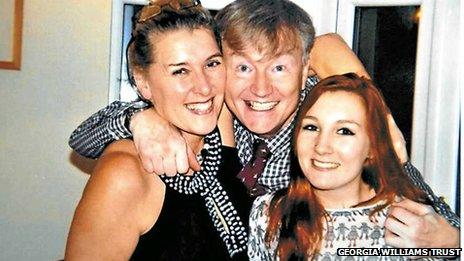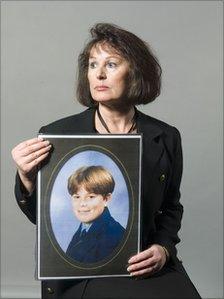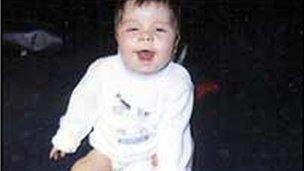Can setting up a charity help families deal with loss?
- Published

Steve Williams said it had been heartwarming to see people getting involved with the Georgia Williams Trust
Every year charitable trusts are set up in memory of people who have met violent or tragic deaths.
Some go on to become major charities - the Stephen Lawrence Charitable Trust, established after the racially aggravated murder of the teenager, is celebrating its 20th anniversary. Others flourish briefly and then fold.
But how does setting up a charity or trust help the families at the heart of the tragedy?
The Williams family, from Wellington, Shropshire, lost their teenage daughter in May.
The body of the 17-year-old was found off the Nant-y-Garth pass, near Wrexham, days after she had gone missing from home.
Jamie Reynolds, 22, of Avondale Road, Wellington, Shropshire, has appeared in court charged with her murder.
After Georgia's death, friends quickly raised enough for a memorial bench, but so many people had pledged money that the Georgia Williams Trust was formed to create a lasting legacy.
"It has been really heartwarming to see people getting involved, organising events and reading all their supportive comments," said her father Steve Williams.
"[The family] have been able to take a lot of comfort from what people have said and how they remember her."
He added: "The trust will ultimately be used to enable young people of Telford and Wrekin to access enrichment activities - whether that be canoeing, rock climbing, tennis, flying or something else and also to encourage young people to volunteer."
'Incredibly painful months'
Richard Langton, chair of the trust, recognises how it has helped the family and is determined to keep close ties with them.
"We hope that the charity can provide a positive focus for the family at this incredibly hard time for them and give them some comfort to know that there is a positive legacy, that Georgia's name will live on," the West Mercia Police inspector said.
"We will continue to work closely with the family - we have a trustee in Scarlet Williams, Georgia's sister, who'll be working with us to make sure we stay on track to deliver from the charity what the family wanted."
Mr Langton said the challenge was to build a charity that can survive "beyond these few incredibly painful months".
The trust already has 5,200 followers on Facebook and 500 followers on Twitter, and Mr Langton is now appealing for those people to "get in touch and get involved".
Shock 'still hits'

Ann Oakes-Odger's son Westley was stabbed at a cash machine
Ann Oakes-Odger knows first-hand the "desperate emotion" that parents experience when they lose a child, and also how having something positive to focus on after the tragedy can help.
Her son, Westley, died after being stabbed in the neck while standing at a cash machine in Colchester, Essex, in September 2005.
Two brothers were convicted in 2006 of his manslaughter and murder.
She successfully campaigned to have a new starting sentence, external for courts considering the minimum term for murderers who used a knife and went on to found knifecrimes.org, external and Victims' Advocate, which help people going through the same experiences she did.
"It has helped after losing Westley," she said about setting up the two organisations.
"I felt sure that once the trial was over there would be a big void to drop into if there wasn't something else to grab onto and to take forward in memory of Westley.
"It's been many years on since that happened to Westley, but I still have days when the shock still does hit," she added.
'Keep his name alive'
It was a collection at her son's funeral which led to Shropshire mother Karen Prior raising ten of thousands of pounds for charity.
Lewis died, aged two, awaiting a heart transplant because of left heart syndrome diagnosed five days after his birth in 2001.
The generosity of people at his funeral gave Karen and her husband, Colin, the idea of launching a charitable foundation in his memory.
The money they raised went to the Rainbow Ward at the Royal Shrewsbury Hospital, where Lewis spent "a lot of time" and to Hope House hospice.
They have recently wound the charity up, having experienced how support can wane as the years pass.

Lewis Prior died while waiting for a heart transplant
"It just seemed to be the right time to stop," Mrs Prior said. "We were a small charity - at the start we got lots of support and did lots of charity events, but as time went on support tailed off."
But setting up the The Lewis Prior Foundation, which raised between £15,000 and £17,000, is not something she regrets.
"It helped us get through 10 years - it made us stronger.
"It wasn't that we [as parents] wanted to be in any publicity," she added. "We used our other son Tom to present cheques - it was mainly to keep the condition in people's minds and to keep his name alive."
- Published11 June 2013
- Published20 July 2010